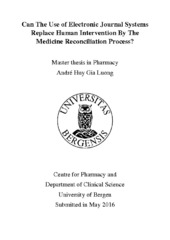| dc.description.abstract | Can the use of electronic journal systems replace human intervention by the medicine reconciliation process? By André Luong Keywords: Medicine/medication reconciliation, electronic journal systems/records, pharmacist service, medication discrepancies, care transition Background: The introduction of the national electronic journal systems is considered a solution to provide effective and correct up to date medication information for healthcare professionals and contribute to minimize the potential of error. Medicine Reconciliation (MR) is the process of obtaining and maintaining and accurate, detailed list of all medicines taken by a patient and using this list anywhere within the health care system to ensure that the patient receives correct medicines. This thesis aimed to determine whether the electronic records provide a sufficient accurate patient medication record to negate the need for human mediated MR. Method: MR were conducted on patients at a Cardiologic bed ward from October 2015 until January 2016. MR were conducted by the IMM- method and documented medicine lists and discrepancies found between the hospital journal, electronic journals and a patient medication history interview. An expert panel consisting of two senior doctors and two pharmacists were asked to score the severity of the discrepancies using a validated scale. Results: 36 patients were included in the study where the study population had a mean (SD) age of 69.8(9.7) and 36.1% were female. The mean (SD) number of drugs the patients used were 6.97(3.03). In this study, discrepancies were found in 72,2% for both the hospital journal and electronic journal systems. 30 (83,3%) of the patients had at least one discrepancy in either the hospital journal or electronic journal systems. For the hospital journals the mean number of discrepancies per list were 2,58, and 2,73 for the electronic journal systems. Conclusion: There was no evidence of the impact of electronic journal systems on the medicine lists to negate the need for human intervention, and the existing process of care transition communication at the healthcare interface is not optimum. Evidence to support the MR intervention and IMM method is needed to conclude on the benefit of the service. | en_US |
